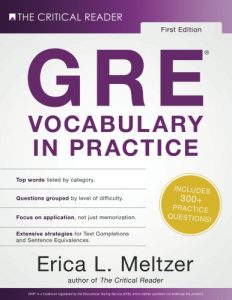One of the things that often gets overlooked in discussions about standardized testing is that scoring well is often a matter of having strategies, plural, rather than a single strategy.
Different items may call for different approaches, even when they are the same type of question, and nowhere is this fact illustrated more clearly than on GRE sentence equivalences.
In some cases, you may be able to identify the answer almost instantaneously using a “shortcut” approach, whereas in other cases you may need to work through the sentence very carefully, circling key words, playing positive/negative, and dodging trick answers left and right.
The key is to know which strategy to use when.
With that said, let’s look at two ways that sentence equivalences can be approached.
1) Use the answers to work backward
Although correct answers to sentence equivalences do not need to be exact synonyms, in many cases they will have very similar meanings. One way to narrow down potential answer choices is therefore to start by scanning the answer choices for such words.
For example, consider the following set of answers:
[A] multiply
[B] abate
[C] merge
[D] relapse
[E] subside
[F] linger
This isn’t the hardest set of answer choices, but it isn’t the easiest one either. None of the words is particularly obscure, and only abate would show up on most traditional GRE vocabulary list. The answers are, however, all similar enough to give a lot of test-takers pause.
If you really know your vocabulary and can keep your head on straight, though, there are actually only two words here that are truly likely to create the same meaning when plugged into a sentence. In fact, they’re straightforward synonyms: abate and subside.
What further suggests that this pair is correct is that it follows a classic sentence equivalence answer choice pattern: one easy word (subside) and one “GRE word” (abate) that test-takers are less likely to know.
To be clear, though: you should never — never — choose a set of answers without going back and plugging them into the sentence to make sure they actually fit. The point of this strategy is only to help you identify the most likely answers faster; you still need to check to make sure they make sense in context.
So now, we’re going to look at the actual sentence.
Some commonly prescribed medications can initially provoke side-effects ranging from anxiety to weight-gain, but these symptoms typically ____________ within weeks as patients’ bodies adjust.
The contradictor but indicates that the two halves of the sentence will have opposite meanings. The first half of the sentence indicates that some common medications cause side effect, so logically, the second half of the sentence must indicate that these side effects eventually go away or decrease — an interpretation supported by the phrase as patients’ bodies adjust.
Given that context, abate and subside make perfect sense.
However, if the correct answers have meanings that are too dissimilar, or if there are multiple synonym pairs, this strategy will be of limited use.
For example, the above set of answers could also be written this way:
[A] remain
[B] abate
[C] merge
[D] relapse
[E] subside
[F] linger
Here, there are two potential sets of words: remain/linger and abate/subside. You can be reasonably certain the other answers are incorrect, but without actually looking at the sentence, there is no way to know which pair is correct.
That is also why you should never jump to pick the first set of synonyms you notice — there might be another pair of synonyms, or relatively similar words, that are a much better fit for the sentence.
If there isn’t an obvious set of synonyms, or if you simply find working from the answers too confusing, then you can always…
2) Work from the sentence to the answers
This should probably go without saying, but just in case, I’ll reiterate it here: in order to work most effectively, you must do some basic legwork upfront, before you check the answers. If you don’t have a clear idea of what sort of words you’re looking for, you’re likely to get confused or second-guess yourself.
The major pitfall of this approach is that you can end up focusing so hard on finding words that fit that you neglect to fully consider whether they create the same meaning.
For example:
Amy Tan’s memoir Where the Past Begins is not a conventional narrative autobiography; rather, it is a series of ____________ chapters that resemble a collage or a scrapbook more than a standard chronological excavation of the past.
The sentence sets up an opposition between Tan’s memoir and conventional narrative autobiography, indicating that the memoir does not consist of a conventional narrative.
In addition, the phrase standard chronological excavation indicates that the narrative does not discuss the events of Tan’s life in order. The correct answers must therefore be consistent with the idea of lacking order.
Now, take a look at the answers:
[A] linear
[B] rambling
[C] unintelligible
[D] fragmented
[E] lyrical
[F] disjointed
Linear is the exact opposite of the required word, so [A] can be eliminated right away.
Rambling means “long-winded” or “wordy.” This type of narrative could plausibly be considered the opposite of a conventional point-A-to-point-B narrative, so [B] fits.
Unintelligible has the right idea, but it’s too strong: it’s unlikely that an author’s memoir, no matter of unconventional, would be downright incomprehensible. It’s a pretty safe bet that [C] is wrong too.
[D], fragmented fits: a narrative that didn’t move in linear or chronological fashion could be described this way.Lyrical (poetic) isn’t the most obvious match for the clues in the sentence, but it still works: a “lyrical” memoir would not be a standard chronological one. So [E] stays.
Disjointed is also consistent with the idea of a narrative that jumps around in time, so [F] stays as well.
So that leaves us with four possible answers:
[B] rambling
[D] fragmented
[E] lyrical
[F] disjointed
The question now shifts from “which words make sense in context” to “which words produce the same meaning?”
Lyrical is the outlier here, so [E] can be eliminated.
This is where you need to be very careful: rambling, fragmented, and disjointed are all similar — but a “rambling” narrative is one that is merely lengthy and tends to go off on tangents, whereas a “fragmented” or “disjointed” narrative is by definition one that presents events in random order, that leaps back and forth in time in a choppy, illogical way.
The difference is subtle, but it’s there. [D] and [F] are exact matches for the clues in the sentence AND produce the same meaning when plugged in, so they are correct.

